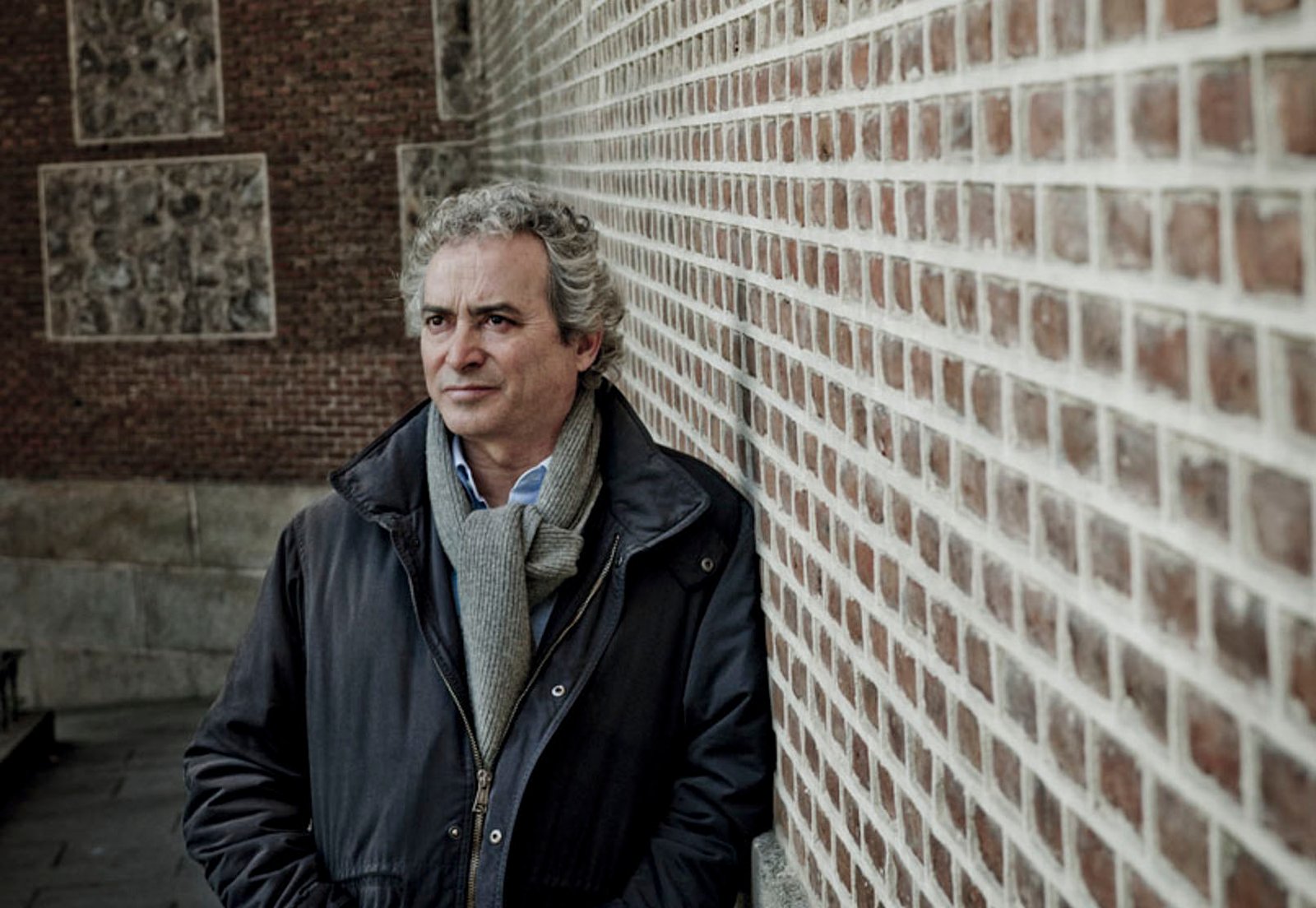
Ildefonso Falcones: The Story of Minor Characters
By Juan Abelardo Carles R.
Photos: Javier Pinzón, Cristian Pinzón, cortesía
Official histories relate the great events of the past and portray the heroes, but they generally do not pay much attention to more minor characters who, though unknown, weave a supporting web of contexts around stellar moments and major figures. The historical novel is an attractive literary genre precisely because it creates hypothetical but plausible persons and events to fill in those spaces and bring to life ordinary individuals in extraordinary situations. This type of fiction is just beginning to gain fans in Ibero-America, thanks in part to the work of writers like Ildefonso Falcones, who creates some of the most painstakingly and best-researched novels in the Spanish language, or perhaps in any language. During his visit, Panorama of the Americas spoke to the author about his creative process, and also learned a little about his opinions on current events.
Your first novel, Cathedral of the Sea, was the most widely-read novel in Spain in 2007 and your next book, The Hand of Fátima, sold 10% of its print run on the day it was launched. Your books reveal a wealth of historical detail and the customs of the era described. The research sounds like it would be very laborious. How do you document the facts before putting the novel together?

It is complicated. I always do a generic study. In other words, I have a concept and a plot, and then I try to find out whether the historic events that occurred will fit in with the story I’m devising. I interweave fiction with the history, so first I need to have an idea of what happened. For example, the persecution of the Gypsies (The Barefoot Queen) occurred in 1749, so I try to tie this in with my proposed plot. I don’t go into depth as to what happened; rather, I try to establish milestones within the story that could have happened. When I see that everything hangs together after this preliminary research, I start to study the information. In this particular case, I looked into how the Gypsies were arrested, what happened, where they were taken, and so on.
In The Barefoot Queen you address the arrest of the Gypsies as the significant historical event, while The Hand of Fátima deals with the expulsion of the Moors. I get the impression that you have an affinity for relating or denouncing historic persecutions of minorities.
No, there is none of that in the first novel, Cathedral of the Sea. It does appear in The Hand of Fátima, where the expulsion of the Moors is central to the plot. In The Barefoot Queen the arrest of the Gypsies is not that significant, although it is a historical milestone. It is impossible to avoid dealing with the arrests if you’re going to talk about the Gypsies of that century. But the novel addresses the issues of slavery in Cuba rather than the Gypsies. The Gypsies came later, when I decided to incorporate music and flamenco.
It is interesting that in The Barefoot Queen, the drama of Milagros stands out: unrequited love, treason, and inequity, or perhaps merely different feelings, since Pedro García does not love her. While somewhat sotto voce, the parallel story of the slave Caridad is more intense, painful, and overwhelming.
Indeed, Milagros is simply a passing fancy for Pedro. She gives up her freedom to marry that man, while Caridad learns to live with freedom. But I think we have two concurrent situations, two aspects: one woman loses her freedom, even if she seems to regain it in the end, while the other woman enjoys freedom for the first time. In any case, the novel is the story of a freed slave who must learn to live, make love, enjoy life, and be free.
There is a striking contrast between the main female characters: Milagros comes across as glamorous, while Caridad is always depicted as reserved and quiet.
These are beautiful love stories, and in the end, Caridad’s lover Melchor ―a minor character― becomes the main character. In my novels the characters always grow as the plot develops.
The Gypsy families in conflict, the Vegas and the Garcías, reflect the different ways in which Gypsies reacted to the hostility of Spanish society: the Vegas try to cling to the essence of being Gypsy, while the Garcías try to compromise. Was it a conscious decision to show that?

That situation really existed. The mass raids on Gypsies that took place during those years failed precisely because they arrested those who were assimilated. Those who were not assimilated and continued to live as travelers were not registered and were not found at their homes, as they did not actually live in them, so they were not arrested. The raids failed to capture the very people they sought.
Looking at it from a dystopian point of view, if the traditional Gypsies had been arrested, do you think Spain would have assimilated them?
No; the Gypsies will never assimilate into any society unless they want to. They have to want it themselves. If they had been caught in the raids, it would have been genocide; they would have all been killed.
Considering Spanish society’s approach to the question of Gypsies and linking it to modern-day immigration from Africa, do you think that the Spain that tried to assimilate the Gypsies is different from today’s Spain in its attitudes and expectations with respect to this new wave of immigration?
I don’t believe there was any attempt to assimilate the Gypsies in that era; the State, along with the monarchy and its advisors, wanted to eradicate them. It seems to me that the population at large thought very little about the Gypsies. We are talking about the 16th and 17th centuries. The Gypsies lived on the outskirts of cities and in slums; they did the blacksmithing work the Spanish did not want to do, so the Gypsies were necessary. The concept of assimilation did not exist at the time. Of course, now we talk about assimilation and we think of schools, health care, buses, a co-existence that did not occur in that era. As for modern assimilation, especially during times when the crisis was not so severe, there have been some efforts to assimilate Gypsies and Muslims in Spain. Everyone who comes to this country is offered health care, schooling, housing, and everything else. There is also illegal immigration, but I think that in Spain all immigrants have received a fantastic welcome from Spanish society. I don’t think there can be any complaints.
That is intriguing, since it seems that your novels The Hand of Fátima and The Barefoot Queen criticize Spanish society for how it treated people.
No. Because we, and certainly not contemporary society, cannot be held responsible for what happened five hundred years ago. We are talking about regimes where 98% of the population was illiterate, did manual or farm work, had no money, did not enjoy any rights, and was at the mercy of the whims of the rich, the nobles, the administrators, and above all, the Church. Therefore, that society could never have been held responsible. They followed the dictates of the Church as issued. Even though the Scholastic era was already in the past, no one questioned the Inquisition or the dictates of the Church. If someone said the Moors should be thrown out, the people accepted it. You can try to raise the awareness of Spanish society about what happened five hundred years ago, but you cannot hold it responsible.

While reading about Cathedral of the Sea, I found that some critics accuse you of slanting historical facts to exaggerate the antiquity of Catalonia at the time the cathedral was built in an effort to affirm a Catalan identity separate from the Spanish. Nonetheless, you are not really a supporter of Catalan independence.
I support autonomy but not independence. I am Catalan and I love my land as much as I love Spain. Yes, some people in Aragón did not like it, while others were thrilled. But some people take an overly simplistic view. The Kingdom of Aragón was Aragón. Then there was the Principality of Catalonia, the Kingdom of Valencia, and the Kingdom of Mallorca. Each kingdom had its own courts, legislatures, currency, and language. This occurred during the Middle Ages through the reign of the Catholic Kings (Ferdinand and Isabella). It is like the British Commonwealth: Australia, for example, is not subject to England, it is a completely separate country. That is similar to the situation with the Kingdom of Aragón and the Principality of Catalonia. In Catalan law, people from Aragón were considered “foreigners,” and I suppose this held true the other way around. The only thing everyone had in common was the King. The Catalans were in no way subjects of the Kingdom of Aragón, nor were the people of Aragón ruled by Catalonia.
It is interesting to hear your opinions, since you are also an attorney and you have a legal perspective on this kind of subject. What do you think of the independence movement?
I think we are already independent. We have an autonomy that makes us completely independent with respect to identity, language, traditions, customs, and institutions particular to Catalonia. Independence in every aspect has been gained. There is nothing more to seek. Independence movements are always rushing ahead, seeking more and more, until they reach a point where the only thing left is to demand full independence. However, full independence means leaving the European Union and that would destroy Catalonia.
Getting back to books, what are you working on now? You already took a peek at the Americas with Caridad in Cuba. Will we see you write about a historical event in the Americas?
I’m writing another historical novel. As for the Americas, I find the history of your countries interesting. In historical order, México would be next. But you need an incredible amount of knowledge; you also have to study what happened in Colombia and Guatemala, for example.